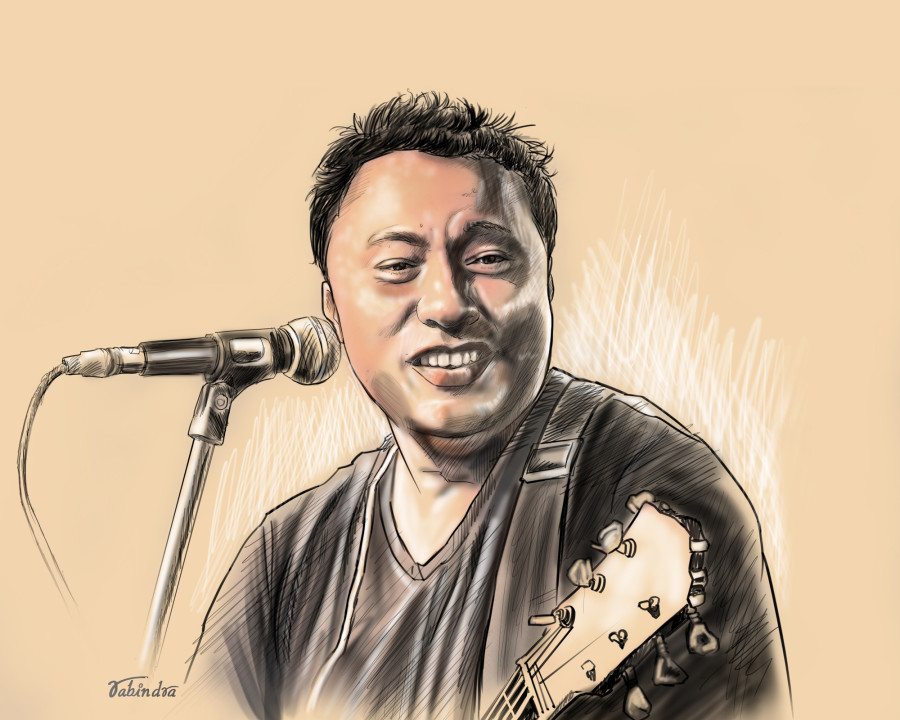Brunch with the Post
Deepak Bajracharya: If you’re good at something, you can succeed anywhere
The rockstar on his musical career, the time he ate snake, and commanding stardom even after more than two decades in the industry.
Pranaya SJB Rana
Deepak Bajracharya remembers the time he ate snake in Hong Kong. It was long ago, he says, when he was just starting out as a musician and it was his first trip abroad. Bajracharya and a bunch of musicians were partying in their hotel room when a friend went out to get some food, and came back with a container full of chopped snake meat. Bajracharya, a little drunk and in search of something salty, scooped up the pieces and ate them all before he knew what it was.
It’s not a particularly special story but Bajracharya tells it with earnestness. It’s just the kind of person he is. The story comes spontaneously, as we peruse the menu at Roadhouse in Jhamsikhel. We decide on a simple pizza and order coffee, while Bajracharya continues to talk in a fashion beguiling his status as Nepal’s quintessential rockstar.
In a career spanning over two decades, Bajracharya has come a long way—from introducing Latin rhythms through songs like ‘Oh Amira’ to the ethnic Newar bent of more recent fare like ‘Man Magan’. He’s been a fixture on the roving tour scene, travelling across the country and across the world, playing sold-out shows with a frantic manic energy that belies his age and experience. Even now, he plays like a young rockstar, just on the cusp of stardom.
“People say, chalis puge pachi aucha palish,” says Bajracharya, who is now in his mid-forties. “I feel like I’ve become much more serious since turning 40.”
For about 20 years, Bajracharya says he treated music as a hobby, something that he did because he enjoyed it, not as a career. He performed if he wanted to, sometimes even for free, and if he didn’t want to, he didn’t, even if he was offered a lot of money.
“I only realised later that if I was going to pursue music professionally, I would have to perform even if I didn’t want to. It had to be a career, not a hobby,” he says.
He’s just returned from a concert in England and he performed a sold-out show in Thamel on Friday. He still dresses in black and he still rocks his iconic black shades. But there has been an evolution in his vocal style and an expansion to his musical oeuvre.
“At the beginning, I didn’t know much about singing,” he says. “I didn’t know what abdomen voice was or what head voice was, I would just sing for hours.”
It was another musical legend, Deep Shrestha, who turned him onto vocal registers and how to sing and not tire yourself out.
“Deep dai warned me that I would destroy my voice if I continued to sing without technique,” says Bajracharya. “These days, singing for an hour at full power will tire me out so I have to use certain techniques so that I can sing for hours without getting tired.”
His music now incorporates more folk and ethnic stylings, like in the uber-popular ‘Man Magan’, which fuses vocal stylings from Western Nepal.
“Man Magan has become another milestone in my career,” he says. “When we released that song, I didn’t think that it would be so popular. We had expected that another song, ‘Wora Para’, which was really catchy, to become a hit.”
Bajracharya attributes the popularity of Man Magan to an evolving preference among the public. There has been a recent resurgence in folk tunes and the use of ethnic instruments. While western-influenced music still remains popular, the rise in consciousness of diverse musical stylings from across the country has meant that the Nepali public is exposed to local flavours.
Bajracharya believes that Man Magan’s video, which currently has over 18 million views on YouTube, also has a lot to do with its popularity. The idea for the video came from Bajracharya’s daughter Cherisa, who correctly identified the song as sounding like a festival in itself.
“We decided on a video that would showcase our culture and heritage and because I am a local,” he says, “they trusted me to use Newar symbols and heritage elements in the video in a respectful manner.”
The song has become so infectious that Bajracharya was even asked to do a Hindi version, in addition to one in Nepal Bhasa. He’s also recorded an English version, which he’s waiting for the right time to release.
But Bajracharya is not one to let success go to his head. He is humble and friendly, with none of the swagger and ego of rockstars. His charm is disarming in its openness. But despite a string of hits in the 90s, like ‘Ritu’, ‘Kali Kali’ and ‘Maya ko Dori’, he disappeared for a while.
“I was confused,” he explains. “All my friends had gone abroad and I thought maybe I should do the same. I even tried to live in the US for a bit with my family, but it just didn’t feel right.”
Bajracharya said it seemed unwise to start from scratch at that age, in an entirely new country. “People said I should do it for my kids,” he says, “but I thought if I was struggling to work and didn’t have enough time for my kids, how would that help them?”
Even his children didn’t want to stay, he said, and so, he returned home, back to his friends, his community and his music.
“Our schools also seem to instill this idea in our children that America or Australia is not just a country but a gateway to heaven,” he says. “But I believe that if you are good at something, you can succeed anywhere.”
His new music is different but a lot of it is still the same Deepak Bajracharya. In songs like Allare, he has the catchy Spanish guitar-influenced rhythm that made him popular in the first place.
“As a musician, I get the tune first,” he says, explaining his process. “It’s become easier these days because I can just record the tune on my phone but earlier, I would get a tune in the car and then I would’ve forgotten it by the time I got home. First I compose the tune and the lyrics get written. But sometimes, the reverse is true, too.”
He works with his drummer, Ricky Shakya, on the lyrics, where he provides Shakya with the tune and some guidance. Shakya is behind all of Bajracharya’s recent music, adopting an easy-going, melodic style of writing.
Today, Bajracharya remains as popular as ever, selling out shows and commanding a massive following, who call him a Nepali rock legend. But he’s too humble to ever take up the moniker seriously.
“To hear that people consider me something of a legend gives me energy,” he says. “But I’m still learning so I like to put out what I’ve learned and it makes me feel good to see that people appreciate it.”
Unlike the words to one of his hits ‘Ritu’, Bajracharya returned—just like the seasons. There aren’t many others like him. Musicians who were once popular in the 90s have disappeared into other work, family life or have moved abroad. Bajracharya has carved out a niche for himself and it’s a comfortable one.
“I don’t want to say that you can’t make a living making music,” he says. “You still can’t be a billionaire in Nepal by making music but you can make a living. I have a car, I’ve built a house, I’ve sent my kids to good schools and colleges, I can afford to drink good alcohol, all by making music. I’ve met my basic needs, and I’m satisfied, what else do I need?”
ON THE MENU
Roadhouse Pizza, Jhamsikhel
Americano: Rs 170
Cafe Latte: Rs 225
Iced Latte: Rs 250
Formaggino Pizza: Rs 880
***
What do you think?
Dear reader, we’d like to hear from you. We regularly publish letters to the editor on contemporary issues or direct responses to something the Post has recently published. Please send your letters to [email protected] with "Letter to the Editor" in the subject line. Please include your name, location, and a contact address so one of our editors can reach out to you.




 15.12°C Kathmandu
15.12°C Kathmandu



.jpg&w=200&height=120)






